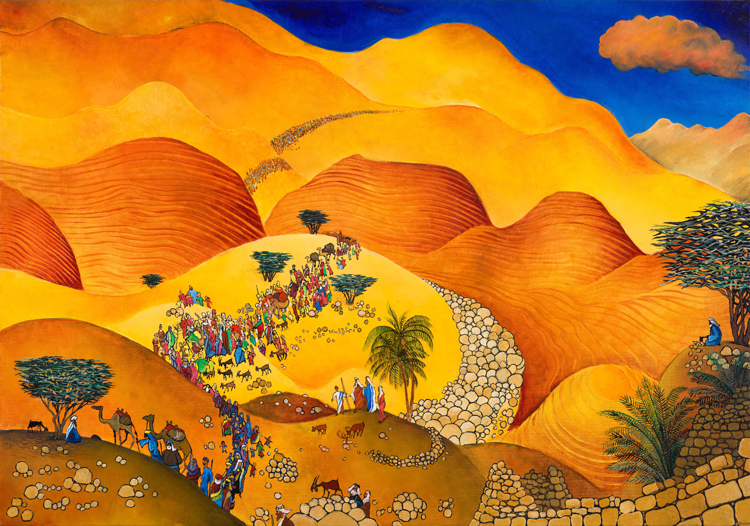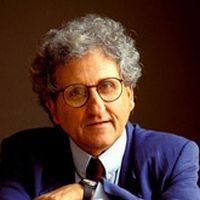With Friends like These: Why Too Many Israeli Artists Side with Israel’s Enemies
by David Solway (November 2023)

Entering the Promised Land, ©Darius Gilmont (used with permission), 2012 (NOTE: Darius does NOT side with Israel’s enemies!)
A writer’s political and religious beliefs are not excrescences to be laughed away. —George Orwell, Critical Essays
I have long felt that many of the finest creative minds in the literary world, whether poets, dramatists or novelists, must be taken cum grano when they see fit to pronounce on political issues. It is as if they are occupationally prone to conceiving the political arena as part of an aesthetic framework, susceptible to snug resolutions, rather than the messy and often insoluble dynamic that it is. The imagination seeks to dominate the empirical domain, especially when the former coincides with an unflinching and tenderly nurtured ideological commitment, generally of the Left. In so doing, it reaps the consequences of a fatal disjunction.
Israeli writers and artists are no exception, always ready to turn against their own people and country. For example, Shlomo Ben-Ami, who in Scars of War, Wounds of Peace: The Israeli-Arab Tragedy, speaks in defiance of both context and truth of a “ruthless Israeli army” perpetrating “atrocities and massacres … against the civilian Arab community.” Or celebrated author Amos Oz who, in the wake of several suicide bombings, wrote an op-ed piece for The New York Times (April 11, 1995) linking Hamas and the Israeli conservative party Likud as mutually responsible for the carnage. Or Uri Avnery who, in his memoir 1948, puts these words into the mouth of a dead friend: “The state you dreamed of in the trenches is dead, even before it was born.” Examples abound. For such people, as for many Jews both in Israel and the diaspora, what is wrong with the Jewish state is the fact of it being a Jewish state.
In this context, I think of the late Abraham Yehoshua, one of the premier Israeli writers of modern times. Such works as Mr. Mani, A Journey to the End of the Millennium, Five Seasons and The Liberated Bride stand out as major accomplishments, not only in Israel but on the international stage as well.

His novel, Friendly Fire, for which he was awarded the 2008 Premio Roma Prize, is a typically rich Yehoshuan product, delving into the “friendly fire” debate between Israelis as to the nature of Jewish history and the purpose of the Jewish state. It is an incendiary subject, for friendly fire, as we know, can be lethal, although in the novel the major characters emerge unscathed and the pivotal issues remain unresolved. Should Jews forget or remember? Can they find solace in the Diaspora or must Jews work out their destiny in the Holy Land? These are important questions and Yehoshua must be lauded for raising them.
Politically, however, given the influence that accrues to his celebrity, he has in my estimation done much harm to Israel’s prospects for an integral future, not so much in his fiction—though his A Woman in Jerusalem reconsiders the status of Israel’s capital—as in his newspaper articles, interviews, public activities, and doubtlessly in his lectures at Haifa University where he was a professor in Near Eastern Studies. Yehoshua was convinced that the Palestinians did not wish to destroy Israel but only to live in harmony and justice within and alongside the Jewish state and that Israel must surrender territory to achieve the elusive goal of mutual accord. He was an ardent supporter of the various Peace movements—including the New Movement that endorsed the electoral prospects of the left-wing Meretz party—parties which, fueled by noble but impracticable sentiments, have been clearly detrimental to the wellbeing of the country.
I devote some time and thought to Yehoshua because I knew him personally and grew enormously fond of him during our encounter at the New Writing Worlds Symposium held at the University of East Anglia in Norwich in the summer of 2005. Our relationship prospered over the next year via email and telephone as we embarked on a “friendly fire” exchange of views, until the eruption of the Second Lebanon War in the summer of 2006, of which our budding friendship was one of the lesser casualties. The fire was not so friendly. Our disagreement over Israeli policy was decisive, Yehoshua lobbying strenuously for an immediate end to hostilities, leaving Hizbollah in place, while I believed that Israel should take advantage of the opportunity to finally crush the terrorist mini-regime which would otherwise continue to threaten the country’s security. The same holds for the current conflict between Israel and the Gaza terrorist state, a grisly déjà-vu.
During one of our supper conversations in the university refectory, the subject turned to Israel’s impending disengagement from the Gaza Strip. Yehoshua, whose sympathies were robustly on the Left and who tended to identify with those whom he regarded as underdogs, aka the Palestinians, could not contain his enthusiasm for the process, making light of my skepticism. The great man knew. All would be well. It had to be. The Palestinians would recognize Israel’s readiness to endure sacrifices, would surely be grateful for the greenhouses and infrastructure left behind to promote their nascent economy, and would respond in good faith to this new and impressive initiative.
“David, my boy,” he boomed in that passionate, basilican voice made to persuade even in the absence of logic or reason, “next year you will be my guest in Israel and we will go together for coffee and hummus in Gaza City.” “Bulli,” I replied, using the nickname permitted among friends, “next year we will be lucky to have coffee and hummus in Haifa.” And the following year, almost to the day, not only was Israel under rocket and mortar attack from Gaza, but Haifa itself was ablaze under Hizbollah missile fire, its citizens, far from relaxing over coffee and hummus in peaceful outdoor cafés, sweltering in makeshift bomb shelters.
But it is not a question of merely one more deluded celebrity. The number of those who dance around the golden calf of a false peace is legion, oblivious to the timely warning of the sage Jeremiah: “From the prophet even unto the priest every one dealeth falsely … saying peace, peace; when there is no peace.” (Jeremiah 6:13-14.) As for Yehoshua, he remained relatively firm in his convictions. If anything, he stepped up the volume and intensity of his “peace” advocacy and his criticism of Israel’s treatment of the Palestinians as well as its putative, endemic belligerency, modifying his stance only intermittently.
In an open letter to Haaretz columnist Gideon Levy for January 19, 2009, Yehoshua justified the Israeli incursion into Gaza at that time as the only means likely to persuade Hamas “to stop [its] senseless and wicked aggression” and the unilateral firing of rockets in “a bitter and hopeless war to destroy Israel.” This certainly seemed to be an advance upon his previous position. Yet Yehoshua persisted in maintaining that peace is ultimately possible with a genocidal terrorist regime whose Covenant swears the annihilation of Israel. Moreover, he signed off his letter to Levy, “In friendship always.” Let us recall that Levy is an influential left-wing columnist who continues to believe that Israel is a brutal colonial occupier, that Israel is a child-killer, and that, as he further argued in his reply to Yehoshua, “I cannot admonish Hamas … Israel is a dangerous and violent country that lacks scruples.” It is no surprise that Levy’s reaction to the current Israeli-Hamas imbroglio is to call for “lifting the criminal siege on the Gaza Strip.”
One would expect no less of a moral crustacean like Gideon Levy, most of his leftish colleagues at Haaretz (Israel’s version of The Washington Post or The Guardian) and the majority of the Israeli media. Indeed, like so many of their Jewish counterparts in the Diaspora, these Israelis are like klutzy suicide bombers who only immolate themselves. After all, one of the distinguishing features of the Left—and especially the Jewish left—is that it is immune to the lessons of experience. There seems to be no real awareness of the Islamic intention to turn the ancient Jewish homeland into a kind of territorial palimpsest overlaid by Arab culture, like those original Hebrew texts, fragments of prayer books and medieval Hebrew codices, that have been largely erased and written over by Arabic texts. This is the political fate that reprobate Israeli writers and journalists are busily tempting. But one would have hoped that Yehoshua, perhaps Israel’s most brilliant writer, had been capable of finally understanding what he and his countrymen were up against.
One thinks of another, next-generation prominent Israeli writer, Matti Friedman, author of important books like Who By Fire: Leonard Cohen in the Sinai and The Aleppo Codex, siding with the progressivist left and helping to foment a citizen and reservist revolt against Israeli Prime Minister Benjamin Netanyahu for proposing to reform a self-appointing, anti-conservative, “social justice” Supreme Court. This was the moment Hamas chose to invade Israel, launch thousands of rockets, shoot families in their beds, slaughter babies, burn civilians alive, and rape young women while inflicting inconceivable tortures.
Conrad Black cites an autopsy report of 24 young women in the IDF, many of whom had been raped, their hips and legs broken, their eyes gouged out, and then murdered by gunfire discharged into their vaginas. You do not temporize with unreconstructed barbarians. There is no excuse for simple-minded idealists, snared in the web of fantasy, who justify, write and march in enthusiastic support of the terrorists, as there is for no forgiveness for those who adamantly refuse to recognize undeniable evil when they see it, and to judge an enemy by his deeds. Such people, the terrorists as well as their supporters, writes Catherine Salgado, “become not only bestial but also demonic.”
For myself, I cannot say that Bulli was demonic, only naïve and prone to delusion, a feature of both the artistic sensibility and the moral primitive. I believe he would have been horrified by recent events, without realizing he had unwittingly helped to bring such atrocities about. I mourn his passing, just as I deplore his politics. After all, we were friends. I suppose one may be tempted to respect writers like Yehoshua and his modern avatar Friedman and many others, too, not only for the quality of their literary work, but for their consistency, if not for their acuity. At the same time, we recall what Emerson said in his famous essay Self-Reliance about consistency, whose virtues are sometimes overpraised. “A foolish consistency is the hobgoblin of little minds, adored by little statesmen and philosophers and divines.” And by writers and journalists as well.
With friends like these.
Table of Contents
David Solway’s latest book is Notes from a Derelict Culture, Black House Publishing, 2019, London. A CD of his original songs, Partial to Cain, appeared in 2019. His newest book, Crossing the Jordan: On Judaism, Islam, and the West (NER Press), will be out in December of this year.
Follow NER on Twitter @NERIconoclast